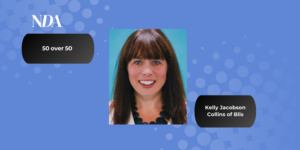Following the latest IPA Bellwether Report that found UK marketing budgets increased for the first time since the end of 2019 in the second quarter of 2021, NDA is getting reaction from across the industry, including LiveRamp, Vayner Media, Quantcast, Skyrise, Incubeta, The Trade Desk and Blis.
Sarah Baumann, Managing Director at Vayner Media:
“Marketers and agencies alike will be relieved and delighted to see this v-shaped curve and excited about the opportunity in the brave new post-pandemic world. How this returning confidence and increased budgets are being applied though is key and there has been a definite shift in understanding of how to deliver both brand value and sales following the digital acceleration most businesses embraced during lockdown.
Full-funnel, meaningful engagement through digital channels is now a reality for many more brands – not least because lockdown has brought previously digital-reluctant or harder to reach audiences online. Couple this with the robustness of video advertising as reflected in the survey findings and marketers have more creative opportunities to really tap into pent-up consumer demand and the desire to move on. If they get the channel mix right and really build on the lessons of the pandemic, they will see their confidence and optimism pay-off.”
Phil Duffield, VP UK at The Trade Desk:
“I’m sure we can all agree that seeing budgets begin to expand again has allowed marketers to let out a sigh of relief after a troubling time of cuts. But, as budgets are unlocked, expectations to prove the ROI of every new pound spent on advertising are higher than ever.
“And if the last five quarters have taught us anything, it’s to expect the unexpected. Consumer behaviours may never return to the predictable patterns we once knew, so decision-makers will need to remain agile in their approach. This is where the beauty of data-driven advertising truly lies – in its ability to allow marketers to remain nimble and flex campaigns as needed. Marketers who invest in data no longer have to fear that months’ worth of planning has been thrown down the drain, as adaptability is baked into strategies from the outset.
“I’m optimistic that marketers who adopt the right tech – with the capability to adapt spend according to what’s working and what isn’t – will have plenty of reasons to be positive going forward. One thing’s for sure – this quarter signals a bright future for the ad industry.”
Matt White, VP EMEA Quantcast:
“The Bellwether report findings reflect not only what we have seen gradually happening in Q1 2021 but also confirms our predictions for what is being termed an ‘advertising bomb’ coming in the second half of 2021. With large scale events being televised across the summer, this is going to be a great opportunity for marketers to spend the shelved budget from 2020 – as we’ve already started to see. Not only is this great news for brands that want to advertise at these events, it will have knock effects for publishers.
Consumers will be looking for the latest scores, information and opinions and they’ll be heading online and visiting publisher websites more frequently. As a result, the demand for ad space could increase. Brands have a years’ budget to spend within six months, so it’s likely that they won’t hold back and will be placing as many ads as possible.”
Charlie Smith, Managing Director, Europe, Blis:
“As restrictions start to ease in the UK, it’s positive to see that marketing budgets have increased for the first time since Q4 2019. This signals a boost of confidence following the pandemic and is a sign that we are heading to recovery, as vaccinations continue to roll out and we slowly return to normality. Indeed our own data highlighted that as of the end of May the number of visitors to high street retailers in the UK was 95% of our pre-COVID benchmark.
“However, the industry is still in a period of uncertainty when it comes to addressing privacy and identity. With Google’s recent announcement that it will delay the deprecation of third-party cookies for a further two years many marketers have been left in limbo. But let’s not forget, most third-party data in the programmatic ecosystem is not fit for purpose. Therefore, as brands begin to replenish their budgets they need to ensure they are investing in new privacy-first solutions that put the consumer first.
“Now is the time for the industry to move away from its previous reliance on personal data, by choosing a new way forward. For example, there are still a wide range of data signals available to draw upon, which, when utilised in combination with location intelligence, allows marketers to map precise audiences for targeting. Ultimately, marketers will benefit from a more innovative and informed approach to digital advertising and the industry should embrace the chance to rewrite the rulebook for a privacy-first world that works better for brands and consumers alike.”
Jonny Whitehead, Board Director, Skyrise Intelligence:
“It’s great to see marketing budgets have expanded for the first time since 2019 with places opening up again and with businesses expected to make a strong economic recovery. This shows that confidence is definitely regaining post-pandemic and the industry is moving in the right direction.
“While progress is certainly being made, agencies and advertisers will need to balance new ways of working with the need to adapt to a rapidly changing digital landscape. There will also be a need to focus on accessing, analysing and testing the use of non-personal targeting signals such as context, time, and location as the industry prepares for further data deprecation if we are to meet the strong growth forecast for ad spend in 2022.”
Sally Laycock, CEO at Incubeta UK:
“It’s fantastic to see marketing budgets are at their highest since Q4 2019 and signals a promising H2 for the industry. As the UK continues to lift restrictions, sectors that had been affected by the pandemic are slowly bouncing back. In store purchases are increasing as the highstreet opens and travel is slowly beginning to open as consumer confidence returns thanks to the vaccine rollout.
“With marketing budgets increasing, it will be important for marketers to continue embracing the digital innovation they’ve invested in during the pandemic. While life is returning to normal, investment in digital should not be discarded and instead it should continue to work in unison with offline channels.
“As the excitement around Freedom Day continues to build, consumers will be out and about, largely returning to their pre-covid habits which means there will be a diverse range of opportunities to reach consumers. To have the best chance of keeping track of a newly mobile audience, marketers will need to develop a unified approach to campaigns and utilise their data-driven capabilities to engage, interact and connect across multiple channels and devices.”
Tim Geenen, Managing Director, Addressability Europe at LiveRamp:
As substantiated by the report, we’ve been anticipating that advertising budgets would rebound and expand in 2021. Our own industry research suggests the same trend, revealing 78% of senior marketers believe that the final withdrawal of third-party cookies will have a positive impact on their advertising strategy.
Net/net: advertisers aren’t backing down. If anything, they’re doubling down, underscoring the value of reaching and engaging with customers across channels. Yet challenges still exist.
While Chrome has delayed the cookie, the world is still more cookieless today than it is cookie-based. Safari, Firefox, mobile in-app, and CTV all operate without cookies. Marketers need omnichannel, neutral, people-based addressability and they want to buy on that today. We see case study after case study showing that people-based addressable buys outperform 3p cookie buys.
Now is the time to encourage new, more direct ways for advertisers to reach and engage high-value audiences, and simultaneously explore direct first-party relationships to expand their data foundation and, ultimately, deliver better customer experiences.
This piece includes, among others, comments from clients of Bluestripe Communications, owned by Bluestripe Group, the owner of NDA.












